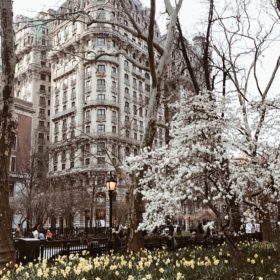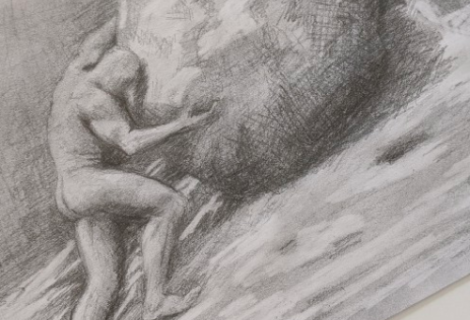Does my happiness inherently come at the cost of yours? More broadly, is our happiness a reprehensible flaunting of sorts? Anton Chekhov examines these questions in his short story, Gooseberries, when he writes:
At the door of every contented, happy man somebody should stand with a little hammer, constantly tapping, to remind him that unhappy people exist, that however happy he may be, sooner or later life will show him its claws, some calamity will befall him — illness, poverty, loss — and nobody will hear or see, just as he doesn’t hear or see others now. But there is nobody with a little hammer, the happy man lives on, and the petty cares of his life stir him only slightly, as wind stirs an aspen — and everything is fine.”
Anton Chekhov, Gooseberries
My first reaction upon reading this: How utterly morose. Isn’t happiness at its core a standalone feeling, immune to petty coveting and comparisons with others? But then, that last line caught me.
“. . . everything is fine.”
Looking back, I have only ever used that phrase when covering up the truth — a deeper cut, a more painful hurt, a shattering of dreams, heartbreak, coping with something beyond comprehension. We only see the outer layers of blissful life, both our own and of others’: Well-curated photos of engagement sessions; Instagram-worthy celebrations; wall-hanging diplomas validating accomplishments. There’s danger there — in constantly feeding and being fed from a filtered, safe stream. We miss out on life.
More crucial to our collective humanity, “we don’t see or hear those who suffer, and the horrors of life go on somewhere behind the scenes,” enveloped neatly in an illusory “. . . everything is fine.”
Through the voice of Ivan, our main guy in Gooseberries (lol, sorry, had to if only for the chuckle I got from thinking what my professor would have said if I called a character “our main guy”), Chekhov suggests that happiness is perhaps an illusion. Necessary, but an illusion nonetheless. Chekhov goes a little further and ponders whether happiness is an unkind, downright selfish slap in the faces of those around us who are in predicaments worse than our own. Is it not true that “the happy man feels good only because the unhappy bear their burden silently, and without that silence happiness would be impossible?”
When a rainstorm delays Ivan’s hunting plans, he and his hunting companion seek shelter from the cold storm in the nearby home of a mutual acquaintance. There, in the middle of characteristically Russian hospitality — going straight to the snuggly interior of a banya session with vodka in hand — Ivan shares an observation about his brother that has been weighing heavy on his heart.
“. . . everything is fine.”
He describes his brother, Nikolai, as a delusional fool having lived through life nurturing a dream of one day owning a small plot of land on which to grow gooseberries. This modest dream grew more and more avaricious as he brought to fruition a sequence of events leading him to marry for money, force his wife into a life of frugality, and eventually spend all his retirement assets on farmland nestled between a brick factory and — it gets worse — a bone-burning factory. And on this land, Nikolai plants 20 bushes of gooseberries. Already old and weary from life’s vicissitudes, Nikolai sees the first harvest with tears in his eyes and pronounces it delicious despite the fact that the gooseberries are hardly edible.
Nikolai’s happiness beams even more forcefully when Ivan visits him. Taking the opportunity to flaunt the fruits of his labor, Nikolai treats Ivan to the gooseberries. Ivan, already irritated by the silent suffering of a terrible handful of gooseberries, grows irate and thus begins his tirade. Disgusted by his brother’s demonstration of personal bliss, he haughtily sees through Nikolai’s modest joy over simple gooseberries: “To leave town, and the struggle and the swim of life, and go and hide yourself in a farmhouse is not life — it is egoism, laziness; and it is a kind of monasticism, but monasticism without action,” he proclaims.
He ends his observation by concluding that any person chasing after personal happiness is, all in all, a narcissistic fool inconsiderate of the suffering of others. But before he can get away with preaching from a pedestal, Chekhov steps in and directs the story elsewhere:
And though he is observant of society’s selfish drives, Ivan’s last impressions on readers weaves a similarly selfish type of inconsiderate behavior: The story ends with Ivan, having enjoyed some tobacco, leaving an unclean smoking pipe, stale with the smell of tobacco, in the bedroom he and his hunting companion share for the night. The tobacco ruins the scent of fresh bedlinen, and his friend suffers a sleepless night. Chekhov manages to get away with taking a jab at Ivan’s haughty rhetoric and muddying our stance on the pursuit of personal bliss. Masterful like French film directors who execute artistically but refrain from providing a denouement, Chekhov leaves us with a well-curated set of musings and zero answers.
Is happiness, after all, a double-edged sword? Chekhov, the way a masterful writer should, gives us the lens to answer that for ourselves.


